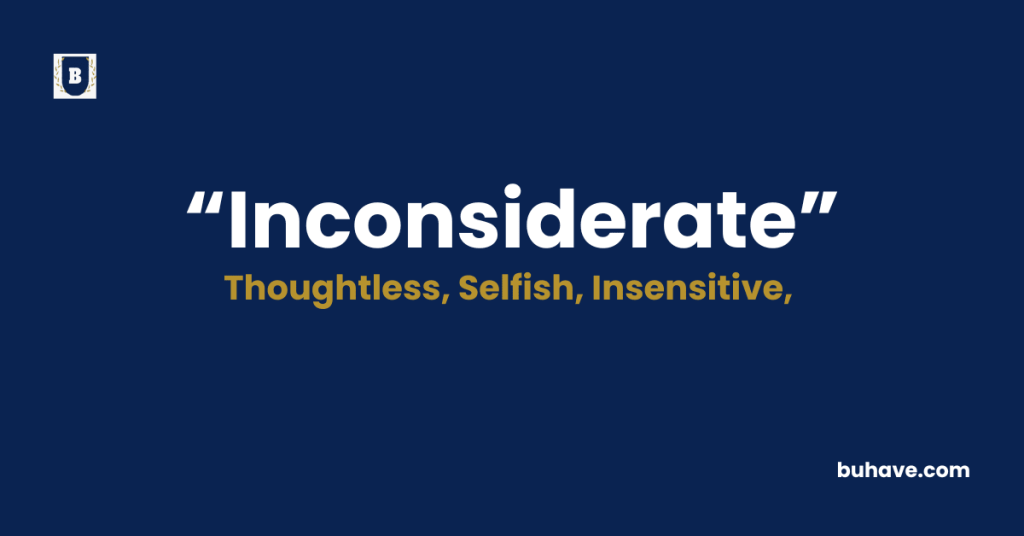The word ‘Inconsiderate’ (Adjective) describes someone who fails to think about the feelings, needs, or rights of others. It refers to behavior that is selfish, thoughtless, or lacking in empathy. In this guide, you’ll learn the full definition, synonyms, antonyms, etymology, and real-life examples of how to use ‘Inconsiderate’ correctly in sentences.
Inconsiderate Explained in Depth
A complete and detailed guide to the word Inconsiderate including meaning, definition, examples, etymology, synonyms, and antonyms.
Meanings of Inconsiderate
‘Inconsiderate’ refers to actions or attitudes that show a lack of regard for other people’s comfort, feelings, or convenience. It highlights carelessness or indifference to how one’s behavior affects others.
Definition
Inconsiderate (adjective): not showing concern for the needs, feelings, or rights of others; lacking thoughtfulness or empathy in behavior.
Etymology
The word ‘Inconsiderate’ comes from the Latin prefix in- meaning “not,” and consideratus, the past participle of considerare meaning “to consider.” It entered English in the early 17th century, referring to behavior that is thoughtless or lacking regard for others.
Example Sentences
- It was inconsiderate of him to play loud music late at night.
- She found his remarks deeply inconsiderate and hurtful.
- Pushing ahead in line was rude and inconsiderate.
- He made an inconsiderate joke at the wrong time.
- Leaving the mess for others to clean was very inconsiderate.
Inconsiderate Synonyms
- Thoughtless
- Selfish
- Insensitive
- Rude
- Unkind
- Neglectful
- Careless
- Disrespectful
- Impulsive
- Brash
Inconsiderate Antonyms
- Considerate
- Thoughtful
- Kind
- Respectful
- Compassionate
- Mindful
- Polite
- Empathetic
- Gracious
- Courteous
FAQs about Inconsiderate
Here’s a FAQ-style guide about the word “Inconsiderate”
1. Is ‘inconsiderate’ always rude?
Not always. Some inconsiderate acts may be unintentional or due to forgetfulness rather than rudeness.
2. Can someone be inconsiderate without realizing it?
Yes, many people act inconsiderately without being aware of how their actions affect others.
3. What are examples of inconsiderate behavior?
Examples include interrupting conversations, ignoring others’ opinions, or making noise when others are resting.
4. Is inconsiderate the same as selfish?
They are similar, but not identical. Inconsiderate behavior may not always stem from selfish intent—it can also result from lack of awareness.
5. How can someone stop being inconsiderate?
By practicing empathy, actively listening, and thinking about how actions impact others before speaking or acting.

















